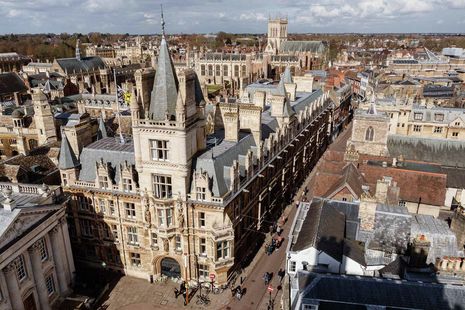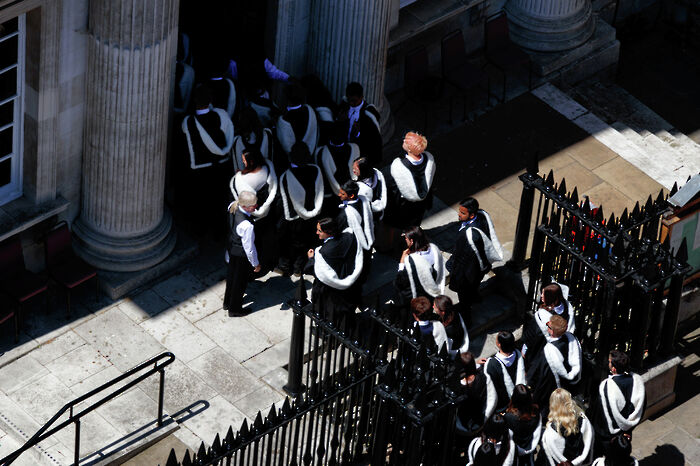Cambridge ranks eighth in UK universities targeted by top employers during pandemic
The University received its lowest ever ranking as graduate scheme vacancies fall across the top 100 employers

In the latest Graduate Market report by High Fliers Research, Cambridge is placed 8th in a list of the top twenty universities targeted by top employers in 2020-21.
This represents the lowest ranking for Cambridge since High Fliers Research began publishing rankings in 2007. Until 2021, Cambridge’s lowest position had been 6th place, in both 2018 and 2019.
In 2021, the top five universities targeted by leading employers were Birmingham in first, followed respectively by Manchester, UCL, Nottingham, and Leeds. The report notes that Manchester, Birmingham, and Nottingham, are ranked 14th, 19th, and 26th in The Times & Sunday Times Good University Guide 2021, respectively, while Cambridge and Oxford are ranked 1st and 2nd, but were only the 8th and 9th most targeted universities by top employers.
‘The Graduate Market in 2021’ is the latest annual report from High Fliers Research analysing the employment prospects and starting salaries of recent graduates. It makes use of data collected from The Times Top 100 Graduate Employers, a ranking based on a poll of thousands of final-year students.
The report notes that the shift to online graduate recruitment processes resulting from the Covid-19 pandemic has resulted in a “significant minority” of top recruiters choosing to no longer target specific universities.
Elaborating on the impact of the pandemic, the report notes that “the onset of the Coronavirus crisis in the UK [...] brought widespread disruption to the economy.”
It continues: “Although many of the country’s top employers had completed their graduate recruitment for 2020 by this point, a significant number of employers that were still recruiting opted to close applications early [...] or leave graduate positions unfilled.”
As a result, the total number of graduate job applications received by top employers increased by an average of 41% in 2020-21, and just over one in ten employers saw a rise of 100% or more. The report states that young people graduating in 2020 who weren’t able to start a graduate job as a result of Covid-19 restrictions “are now competing with this year’s final year students for places on employers’ 2021 graduate programmes.”
The Armed Forces saw the largest increase in graduate applications of any sector, with a rise of 75%. Consumer Goods and Chemical & Pharmaceuticals reported increases of around 60%, despite the latter expected to recruit for up to a third fewer vacancies than in 2019.
According to the High Fliers report, the marked increase in graduate scheme applications does not translate to positions available. There was a 12.3% drop in graduate positions open in 2020, and a rise of only 2.5% is expected in 2021.
The 2019-2020 academic year was set to see record-high levels of graduate recruitment for the UK’s top employers, but the COVID-19 lockdown in March brought significant disruption. In total, the leading UK employers recruited 3,700 fewer graduates than planned, cutting recruitment by 15.1%.
The effect of the Coronavirus pandemic has prompted the largest annual drop in graduate recruitment for eleven years and the most significant shift from academic year recruitment targets since the 2008 financial crisis and recession when entry-level vacancies fell by almost a quarter.
Graduate recruitment fell in thirteen out of fifteen industries; the Investment Banking and Oil and Energy sectors were the only to experience a percentage rise in recruitment compared to 2019. The charity and voluntary sector took the biggest hit with a 40.1% decrease compared to recruitment in 2019.
Recruitment targets published in September 2020 estimated a further downfall in recruitment, but the latest assessment shows that there has been a 2.5% increase in the number of available graduate vacancies in 2021. Furthermore, 53% of the leading employers reported that they are still planning to deliver in-person internships and placement in the summer of 2021.
In terms of job prospects for the 2021 job market, the public sector has been identified as the largest recruiter, with a record 5,400 entry-level positions available with schemes such as Police Now, Teach First, and the Civil Service Fast Stream.
High Fliers also investigated the starting salaries that the UK’s top employers offer new graduate employees in 2021. Since the end of the recession in 2010, there have only been two annual rises in average starting salary, one in 2014 and one in 2015. Wages have remained at an average of £30,000 since 2015 and are again expected to stay at this level for 2021.
In 2021, fourteen organisations are offering starting salaries of more than £45,000, with the most generous salaries, £50,000, coming from the investment bank sector. The highest published graduate salaries come from law firms White & Case and Clifford Chance, with retailer Aldi making the top six at £44,000. Meanwhile, three employers are offering starting salaries of £20,000 or less, with the lowest average salary coming from the public sector.
The fall in graduate employment schemes follows from findings that unemployment for 16 to 24-year-olds increased by 124,000 to 597,000 in 2020. This is in comparison to 407,000 of people over 50.
Meanwhile, a lack of graduate jobs may have also contributed to the rise in postgraduate applications for 2021. The University of Reading cited a 27% increase in applications for postgraduate taught programs, believed in part to be a result of recent graduates seeking to further their qualifications in the hope of appearing stronger in a competitive post-COVID job market.
 News / Clare Hall spent over £500k opposing busway 24 December 2025
News / Clare Hall spent over £500k opposing busway 24 December 2025 Comment / The ‘class’ of Cambridge24 December 2025
Comment / The ‘class’ of Cambridge24 December 2025 News / Caius mourns its tree-mendous loss23 December 2025
News / Caius mourns its tree-mendous loss23 December 2025 Comment / League tables do more harm than good26 December 2025
Comment / League tables do more harm than good26 December 2025 News / Girton JCR publishes open letter expressing solidarity with Palestine25 December 2025
News / Girton JCR publishes open letter expressing solidarity with Palestine25 December 2025










